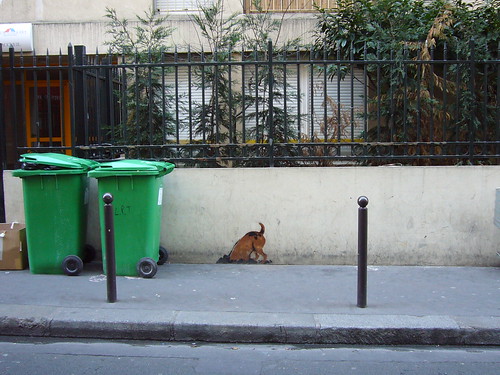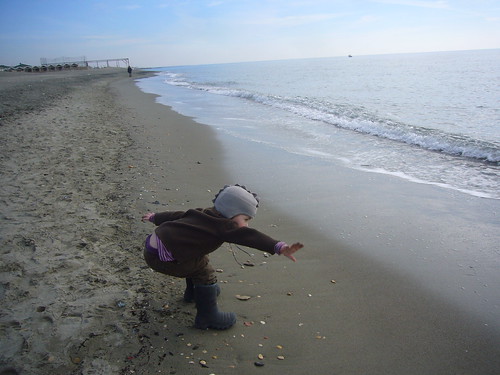Category: "Writing"
09/02/12
The Stage is all the World, and the Players are mere Men and Women: Performance Poetry in Postcolonial Paris - What it is, and the questions it answers
Yesterday afternoon, an email popped up with the names of the members of the evaluation committee and a date for the possible public defence. It came completely out of the blue, as I was sure this process would take ages. And also, until I read the names of the two women who will scrutinise and judge it, and decide whether I’m ready to become a doctor or not, I think it hadn’t been really real to me that the work is coming to a conclusion. If everything goes well, the defence will take place in first half of June, which means that the verdict of the committee should be ready in early May. After that, preparation will probably occupy more and more of my time, particularly when the theme of the trial lecture is settled, two weeks before the defence. That leaves three months from now where I can get on with my new project. I feel a definite need however to sum it all up before I put the pile of sheets (it won’t be properly printed before it is accepted) on the shelf for a while.
07/02/12
The narrow-mindedness of finishing a thesis
It’s time to start summing up not only the last months where I’ve been conspicuously absent from this blog (again) but also, finally, the whole research project! The only thing left now is to wait for the verdict of the opponents and the ensuing, hopefully, public defence of the thesis. My desk is almost cleared, notes and scribbled scraps of paper are thrown away, books and articles are stuffed back into the shelves, and I’ve made small steps in other academic and bureaucratic directions. I’m therefore no longer among the Parisians, either physically or mentally. (Very soon I’ll be among some suburbanites outside Oslo.)
People have of course told me that wrapping up take longer than one thinks. And I have of course thought that, oh no, not for me. But yes it has taken a little longer than I thought. The stretch of time I’ve spent neglecting almost every other engagement (not familial, however), has consequently become quite long. In fact so long that I’ve problems getting back into doing different things during a day again, not only the predictable thesis-thesis-thesis-visit father-pick up in kindergarten-make dinner-thesis related stuff, or perhaps the occasional newspaper-bed. Now, I need a calendar again, and I must read the emails I get concerning seminars and stuff, and I must remind myself that I’m not only available for sporadic socialising, but it’s also a nice and good thing to do.
I’ve not been very stressed during the final 18 or so months of writing up, but I’ve been extremely narrow-minded. There have only been a handful of activities that succeeded in diverting my attention. The most time-consuming was reading about the 22 July terrorist attack and the sombre universe it sprang from. I’ve hardly read a work of fiction, and hardly seen a film. Now, it’s time to climb out of the cave and see what’s going on. It’s definitely time to look a little wider. And it’s time to reply to inquiries and attend seminars, time to write, and – definitely – time to look for new work, and time to start a new research project and think entirely new thoughts.
19/06/11
Pieces into place 2
Now, all but one chapter have found their final form, with only minor polishing and weaving together left to do. As this blog has helped me to keep a more coherent and exterior perspective on what I’m doing throughout the various stages of the project, I would very much have liked to keep this diary updated as the nuts and bolts, long lines and small steps took shape. But although this final phase has been all about making sense of and making accessible all the preceding work – thus the writing of the small posts in this research blog writ large – it’s been difficult to find time to write here. Since August last year the writing has been flowing almost seamlessly (after I lost my presentation due to a ridiculous back-up mistake the day before I headed off to a conference, and I had no choice but to speed up considerably and quickly fill the gaps with top-of-the-head translations of French slam poetry). And the pieces have fallen into place with astonishing precision. – Here comes a few examples, from the remaining chapter which I’m working on now and which is still in a mess: The seemingly low level of education has puzzled me (although none of the people I asked about it agreed that it was particularly low). Then I – a bit late perhaps, but some differences are less obvious to look out for than others – found out that there’s a far lower percentage of university degrees and even final general high school exams in France than in both the US and Norway. In the same book where I read this – The Dignity of Working Men, a comparison of working class moral boundaries in the US and France – I also learnt that class solidarity and class struggle are still overwhelmingly present in France, despite the decline of the communist parties and the exceptionally low percentage of labour union membership. This puts the emphasis on solidarity and equality of the slam sessions into a far broader context than I initially thought and lead me to re-read The Distinction by P. Bourdieu. And oh my, what exhilarating surprises! Almost on every page there were things to enter into discussion with, and I started to wonder if the slam milieu could provide an example of an community and art form of liquid modernity (Z. Bauman) – thus were coherent boundaries have dissolved – but which has retained a strong sense of (class) solidarity… Well, well, more on this later when the bits and pieces of this chapter also find their place.
The point of this post was to state that I’m still here, thinking about this fieldwork and writing up blog has followed me through thick and thin of the last five, soon six, years. Now, it’s no more than a few months left, and I hope to be able to leave a trace of this final phase, as the last threads find their places in the tapestry.
10/01/11
Manifesto for faster writing and shorter workdays

To my surprise I discovered that it was easy to change my way of writing and even my way of working more generally. The writing came easiest. When I wrote my master thesis, on very good days I could produce half a page. I could file and mould every sentence for hours, a technique I think contributed to the far too dense structure. Not only is the fluency easily lost, but I also started to find it a boring way to work.
07/01/11
Create expectations for the reader
I wrote about my expectations of Hemingway’s little book from his early years in Paris, A moveable feast, a while ago. Silly me thought I would find the reason why it was particularly hard to write about Paris in his book, as he wrote so evocatively:
20/08/10
Structuring your presentation
(from Writing for Scholars, by Lynn P. Nygaard, 2008: 158-162)

First; Introduce your research question – simply and concretely.
Then; you can provide the necessary background or context – all the time answering the question: “why should you listen to this?”
Next, the thesis statement before its evidence.
Finally; the conclusion. Answer the question: “What is your aim in giving the presentation?”
- Tell a story with a narrative flow: A beginning, a middle and an end. Look at how the points are connected (Nygaard: 159).
The presentation should respond to four questions from the audience, corresponding to the four stages in the learning circle:
1: Why are you telling me this?
2: What is your point?
3: How is this relevant in a wider context? (Either to a real-world context or to a scholarly discourse.)
4: Allow audience to integrate what they’ve learnt into their own work (Nygaard 2008: 160-162).
08/08/10
Things to remember when presenting papers at conferences
(Points gathered both from personal experience as well as from listening to others)
* If you want to show some of the great video material you’ve worked hard to collect and that will visualize your speech wonderfully, be sure to bring any possible transformer or connection cable that might be needed with your particular Mac (which might not be the same connection cable that the earlier speaker with a Mac used)
* Make sure you know how to compensate if the visual presentation do not work (even though you followed the previous point)
* Know the text very well and don’t lose the flow of recitation
* Know the time it takes to go through every section and how slow it should be recounted (so you don’t get stressed and lose the pace when the shair shows you the 5 minutes sign)
* If you are of the sensitive kind, remember to ignore the audience when they start moving around in their chairs, yawn or flip their sheets – some people just becomes like that after sitting straight listening for two hours in a row. Very likely people will come afterwards and say that the atmosphere was just electric during the empirical quotes and it was all so moving and so on. So, either focus on the attentive faces that follow you or just turn inward and follow the flow of your text
* Please, state the purpose and aim of the presentation! What does all this lead to? In my opinion, the listeners can’t be reminded too often…
* Reading or not reading, I don’t really have any strong views, but too quick is not good, whether it is read or spoken. Neither is too many diversions from the line of argument and too many ehs…
* And now, in the all-embracive age of powerpoint, why not reflect on what the visual aids can and cannot do for exactly your purpose.
15/04/10
What can people learn from your research?
Yesterday, I had to answer the question: “What can people learn from your research?” Eh… Learn from what I do? So this job isn’t just a way of keeping another overqualified person out of unemployment statistics? Well, joke aside, …but I have to admit that such an upfront and naïve question up here in our ivory tower-existence made me realise that I think far too little about the very simple fact that people might learn something from what I do. Even if I often think that much in this world is outside of my jurisdiction and beyond repair, I hope I haven’t totally given up on the idea that what I do might be useful, - also above the personal pleasure of it and the societal benefit of not spending my days doing something that is harming the environment more. From now on, I’ll have in the back of my mind; what can the reader learn from what I write… or perhaps less didactic and patronising; which experiences do I want to convey? What do I want the reader to experience and retain from my text? Something like that…
And what did I answer to the question yesterday? First, I though eh… something about social classification blah blah…? That they are different in different societies…? That social cohesion and nationalism is different in different societies…? No, these things people say all the time. What I really want try to convey is perhaps the greatest thing about the Parisian slam poetry: How little it takes to create an inclusive environment where even a newbie like me can feel at home, and where one get to know others and get to express oneself. Can I write a manual to an open, cosmopolitan democracy in practice!?



